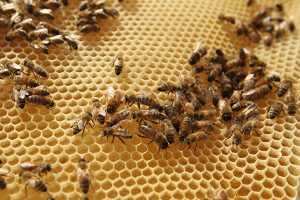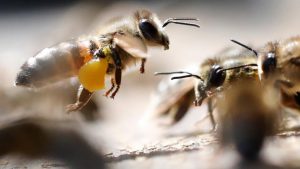The most commonly used insecticide in the world, neonicotinoid insecticides, can effectively thresh many crop pests, but at the same time have a potential impact on key pollinators, bees. High doses of neurotoxin can damage the memory of bees and the ability to collect food. Now, using an innovative tracking technology, the researchers have confirmed that neonicotinoid insecticides can significantly reduce the activity of the hornet bee colony, making them less likely to take care of the young bees, and the colony regulates the temperature of the nest. more difficult. This discovery or help clarifies a long-standing puzzle: how insecticides harm bee colonies.

The bee lost its directionality (source: http://www.epochtimes.com/gb/12/7/12/n3634183.htm)
James Crall, an animal behavior biologist at Harvard University, wants to analyze the collective behavior of bees exposed to neonicotinoid insecticides. However, this is not an easy task. Past efforts to track bees involve applying pigments to bees, recording short videos, and then carefully analyzing and annotating these behaviors. “It’s difficult to shoot a 5-minute tracking video,” says Crall. “It’s hard to imagine tracking multiple bee colonies for several days in a row.”
Crall and the team found a solution with the tracking software they wrote at Harvard University. He and his colleagues glued a 3 x 4 mm label with a unique pattern to the back of hundreds of bumblebees. Finally, using a robotic device from the Drosophila Lab, they assembled a mobile platform with two high-resolution cameras. These cameras can “peep” a dozen bumblebee colonies on a regular basis, pick out the movements of labeled bees, and then transfer them to a computer for analysis.
Subsequently, the team provided syrup to nine bee colonies, which were spiked with imidacloprid, a neonicotinoid insecticide at a concentration of six parts per billion. These bees can “enjoy” the syrup whenever they want to eat. In the 12-day trial, the overall activity of bees and their social interactions decreased. For example, bees that control bee colonies spend about 25% of their time on caring for young bees, while bees that eat insecticides spend 20% less time on this.

Rescue bees, French banned nicotine-based insecticides (source: http://cn.rfi.fr)
The team also found that the ability of bees to fall asleep became inexplicable at night. In further experiments, Crall and colleagues confirmed that imidacloprid hindered the ability of colonies to regulate nest temperature.
Insecticides affect the normal life of bees in all aspects, so governments and regulators should control the use of pesticides.
